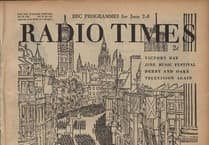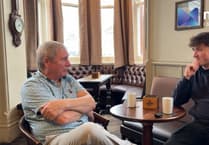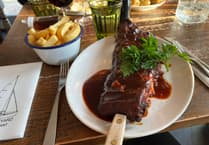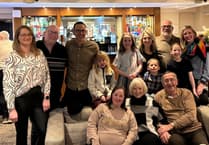In the summer of 1944 Kathleen Oates - a Wren assigned to the Women's Royal Naval Service during the Second World War - was transferred to the Isle of Man. During her time on the island, she wrote dozens of letters to home which provide a unique commentary on the operations at Ronaldsway and what life was like on the Isle of Man 80 years ago. Her daughter, CHRISTINE SMITH, pores through her mother’s letters as part of a series of columns based on Kathleen Oates’s writing...
Eighty years ago this week, on Wednesday December 6, Kathleen Oates sought refuge from a cold cabin and started a letter from the comfort of an armchair in the YWCA, where two fires were going. She noted that the radio was playing; she would have wanted its cheer after ‘a depressing night flying duty’.
Her letter contained yet more tragic news of a lost Ronaldsway plane the previous night. ‘One of the kites didn’t return. We were in touch with him about 8:15pm on R/T [radio transmitter] then a few minutes later the Coast Guard rang up to report the crash. The usual rescue services were launched and we sent up other planes to drop flares. When I went out for a walk about 11 o’clock, I could see them dropping over the sea’.
Two of the ‘Subby’s’ [Sub Lieutenants] she worked with were about to go on draft [i.e. be conscripted] for a further navigational course before joining the Barracuda Squadron. ‘Poor Ian was rather dubious about it, I think – he was on duty last night and I expect he was thinking it might have been him. The observer has the least chance of escaping’. It was presumably a Barracuda which had gone down – and presumably Ian would be an observer. An November letter of Kathleen’s, had told of a plane in the sea, where the pilot and gunner had managed to get out in time, but the observer did not.
A later note in the letter, added before posting, confirmed the loss. ‘No-one was found from the plane – we searched this morning as well – that’s 3 more men gone.’
Typically of the times, despite the loss of a plane and 3 men on the night of Tuesday December 5, a dance for the Forces at Ronaldsway went ahead as planned the following night – and Kathleen went too. It took place in a hall the size of a sizeable church (Kathleen referenced the Church of the Martyrs in Leicester). ‘It was quite good fun. The hall was very poorly lit but there was a good floor. There were plenty there – especially after 10 o’clock. Several of the boys had bottles in their pockets – saving up for Christmas! You can guess how half the camp’s population will be celebrating!’
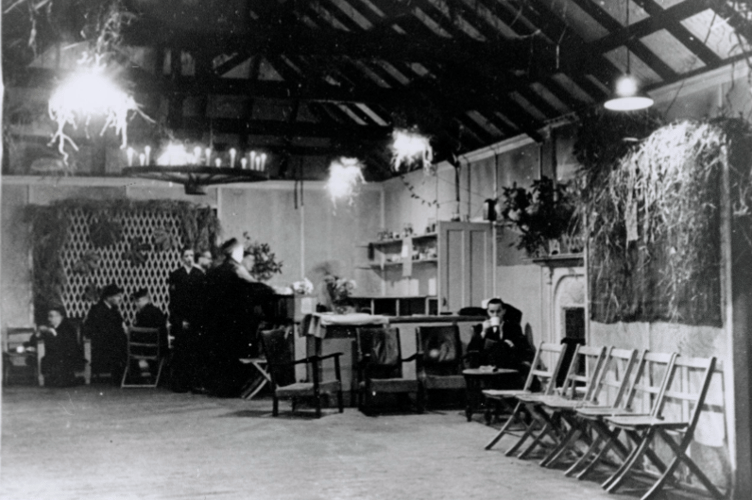
The night after the dance, December 7, Kathleen ‘was off duty and I spent most of my time playing table tennis – we’ve got the table in the rec now’. She also mentioned that on the past Sunday, Divisions were cancelled due to heavy rain, but the Wrens were instead ordered to go to church in the local village. As after previous losses, the rhythm of life at Ronaldsway continued.
Kathleen corresponded throughout the war with Paul, a friend from Leicester who had trained to be a pilot and was currently stationed in South Africa. He may have been the reason she never seemed to have a boyfriend, either in her previous posting in Liverpool or on the Isle of Man. – Lieutenant Whiteaker had been the only potential candidate, and by now he was no longer at Ronaldsway. Paul’s most recent letter contained the tantalising statement, “yesterday we ate peaches at the swimming pool in Pretoria “. This vision from another world was clearly worth repeating in her letter home, and Kathleen commented, ‘- just to make my mouth water, I presume!’.
She went on to report that Paul ‘thinks there is a chance of being transferred to the Fleet Air Arm as a lot of RAF pilots are changing over. I remember seeing in the paper that several hundred were changing over’. This prompted a further reflection from Kathleen which was very different in tone to her pro-Navy statements when she first arrived on the Isle of Man in August: ‘I think the Fleet Air Arm ratings are of a much higher standard than the Navy. The FAA is a small service and they can afford to be selective, I suppose”.
Writing about Paul and thinking of the men who had been lost with the plane, prompted memories of the young men she had come across when working in Liverpool, and she wondered how they were faring. She recalled the Greek sailors from Liverpool, from the Salamis and Tompazee ships – ‘how they used to wander through Liverpool in gangs, how proud they were when we went on board, of their few words of English – how anxious they were to give us chocolate and cigarettes and food’. Understandably, Kathleen was in a pensive mood when writing home that week.

